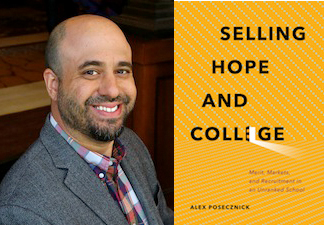Alex Posecznick peers behind the curtain of college admissions
Every spring, headlines announce the admissions statistics for America’s elite universities, which admit a small percentage of their applicants, and a minuscule percentage of American college students.

In Selling Hope and College: Merit, Markets and Recruitment in an Unranked School, Penn GSE’s Alex Posecznick examined the other end of the spectrum: colleges that need to recruit students in order to stay in business. The book chronicles Posecznick’s ethnographic study of the admissions office at Ravenwood, a pseudonym for a private, non-selective college in the northeast that mostly educates low-income minority students.
As Posecznick told Inside Higher Ed, “part of what stood out to me is how there are so many institutions that are invisible, that aren't being noticed by the rankings system or the public eye, and yet there is so much going on.”
“Part of what stood out to me is how there are so many institutions that are invisible, that aren't being noticed by the rankings system or the public eye, and yet there is so much going on.”
As Inside Higher Ed recounts, Ravenwood’s admissions office was filled with educational, financial, and ethical questions.
“In Selling Hope and College, the dilemmas are about how to attract students: Should admissions standards be lowered to attract more students? Should faculty hiring place a priority on traditional teaching and research success or Ravenwood's traditional emphasis on social justice? Should facilities decisions focus on façades that would impress visiting potential students as opposed to teaching and learning spaces? (Spoiler alert: Most of the decisions discussed in the book are resolved in ways to maximize the number of students.)”
Read the full Inside Higher Ed piece here.

